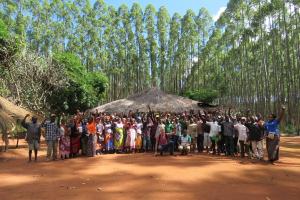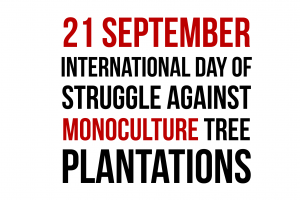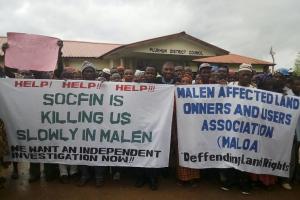Struggles Against Tree Monocultures
Corporate profit drives land grabs to install industrial tree monocultures. Where industrial plantations take root, communities' territories and lives are violently invaded, their forests destroyed and their water polluted. When communities resist, companies tend to respond with aggression. Despite this extreme violence, communities around the world are resisting, organizing and joining forces to defend their territories. Every September 21 the International Day of Struggle against Monoculture Tree Plantations is celebrated.
21 September, 2021 – International Day of Struggle against Industrial Tree Plantations.
(Only available in Portuguese)
Oil palm company Socfin has meant oppression for affected communities. Yet, women have to confront another patriarchic system. Paramount Chiefs are the custodian of the land according to customary law, which often give men decision-making and ownership power over land.
(Only available in Portuguese) Confira o vídeo com o posicionamento da comunidade contrária à passagem de caminhões de eucalipto.
Patriarchal oppression is inseparable from the industrial plantation model, and it is at the base of how companies generate profits. Companies target women, including due to their fundamental role in community life.
Land grabbing in Brazil is a clear example of organized crime, of land theft from small farmers.
This Open Letter is a public reply from the Alert against the Green Desert Network from Brazil and WRM to an email from the investment department of the HSBC bank in the USA, requesting more information regarding the Suzano paper and pulp corporation in Brazil.
Conversatorio virtual realizado el 21 de Septiembre de 2020, en conmemoración del Día Internacional de Lucha contra los Monocultivos de Árboles. Organizado por la Red Latinoamericana contra los Monocultivos de Árboles (Recoma).
It is a day for organizations, networks and movements to celebrate resistance and raise their voices to demand, “Stop the Expansion of Monoculture Tree Plantations!"
With the Covid-19 crisis, the initiatives of movements and collectives based on feminist economics have gained strength. Feminist economics leads us to reflect on the updated mechanisms of control, while continuing to affirm the capacity for resistance and reconstruction of bodies in movement.











